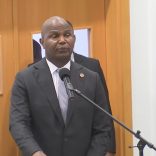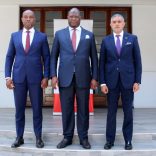Mozambique: State needs effective tax collection, warns Chapo - Watch
Mozambique businesses call for lower tax burden to drive private investment

Photo: CTA
Mozambican business leaders on Thursday called for a reduction in the tax burden to encourage private investment and for an end to certain tax benefits, during a meeting with the International Monetary Fund (IMF) representative in the country.
“The IMF believes that the level of revenue we are able to collect, in percentage terms and relative to other countries, is well positioned. However, our expenditure is also very high. So, their proposal is to seek solutions on the expenditure side, identifying those expenses that can be eliminated,” said the Deputy Director of the Confederation of Economic Associations of Mozambique (CTA), Eduardo Macuácua, following a meeting with the IMF Resident Representative in Maputo, Olamide Harrison.
The CTA, in turn, argues that reducing the tax burden and facilitating investment recovery could help broaden the tax base and even reduce the size of the shadow economy.
“What we are saying is that the government also needs to implement reforms that enable more companies to access the necessary conditions to start and launch their projects, so that, in turn, these companies can begin contributing [paying taxes],” said Eduardo Macuácua.
Mozambique is currently facing high levels of public debt, at a time when national revenues stand at around 27% of GDP, while expenditure is approximately 34%. For this reason, the IMF – which did not issue a statement following the meeting – has advocated for a reduction in current expenditure.
Last month, the Mozambican government made “wage bill control” and “stabilisation of the State’s debt burden” its priorities, while estimating a fiscal deficit of over 6% of GDP for 2026.
In this context, business leaders are also advocating the end of certain tax benefits, including those granted to some foreign investments, as a way of broadening Mozambique’s tax base.
“We also have to look at those benefits that were granted to some foreign investments and which had exemptions for some time, but now is the time to reassess and see if they can contribute to public revenue,” said Macuácua.
In June, the Centre for Public Integrity, a Mozambican non-governmental organisation (NGO), indicated that the government could have financed 69.4% of expenditure between 2016 and 2022 with the amount of tax benefits granted to multinationals.
In an analysis of the executive’s accounts, CIP noted that “the government waived approximately 150.6 billion meticais (about €2 billion) in revenue due to tax benefits it granted to megaprojects.”
In the same period, the executive mobilised around 216.9 billion meticais ( €3.7 billion) in treasury bills and bonds to cover the fiscal deficit.













Leave a Reply
Be the First to Comment!
You must be logged in to post a comment.
You must be logged in to post a comment.